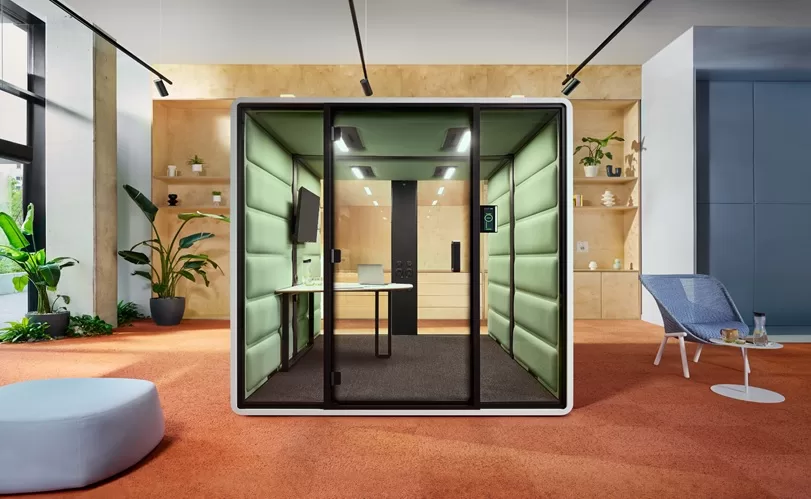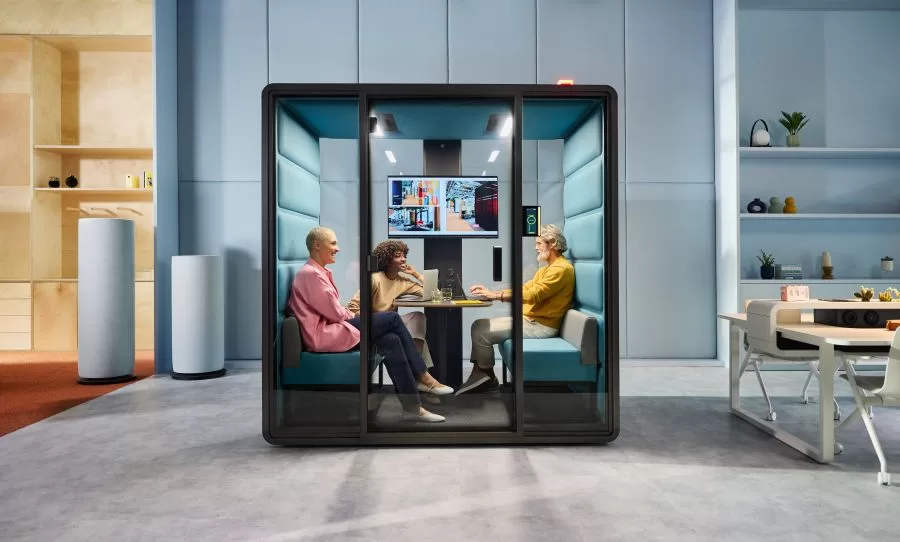Health
How can sensory overload in the workplace be prevented? The role of acoustic work pods

Modern open-space offices are full of life and energy, but many workers, especially those with ADHD, autism, PTSD, or other conditions that affect how they process stimuli, may experience sensory overload there. Stimulus overload, or a situation where a person’s senses are excessively stimulated by the environment, often leads to reduced performance and feeling poorly. This is why many companies are looking for ways to reduce the excess of stimuli and ensure optimum working conditions for their employees. Acoustic pods are not only a refuge from noise, but also provide space where people can recover their strength and concentration and get a moment of respite from various stimuli.
What happens to the human brain when it is attacked by strong stimuli?
When the human brain is exposed to an excess of stimuli, it initiates a comprehensive stress reaction aimed at preparing the body for action. In response to stimulus overload, the levels of adrenalin and noradrenalin increase. This leads to a number of physiological changes such as a faster heartbeat, an influx of blood into the muscles, and even stomach cramps. These responses are part of the ‘fight-or-flight’ mechanism that constitutes a response to the dangers perceived. However, exposure to long-term and intensive stimuli can lead to a paralysis and inability of the affected person to take action. If the person does not undertake activities that will help relieve the stress, the long-term stimulus overload increases the level of the stress hormone and interferes with normal functioning of the body. It should be noted that excessive stimuli affect people’s physiological functions, but also cognitive and emotional processes, which significantly lowers the adaptation capabilities of the brain.
What is the effect of sensory overload in the office on work performance?
In open space offices, workers are often overwhelmed with an excess of visual and auditory stimuli. This is particularly difficult for people with such disorders as ADHD and autism. Noise, bright lights, constant activity in the surroundings, and many other sensory stimuli can simultaneously affect different senses.
It should be noted that sensory overload in the workplace affects not only people’s mood, but also their performance, and can raise their level of anxiety. Even though brief periods of stress, referred to as eustress, can have a motivating effect, high level of stress in the long term deteriorates the ability to focus and has a negative effect on the performance of work duties. Moreover, stimulus overload in the workplace can lead to mental and emotional exhaustion, which increases the risk of burnout, irritation, and deteriorated relations in teams. People working in such an environment are more likely to take sick leave because they seek relief from the excess of stimuli at home.
Sensory overload in large and small companies can be better managed through a proper organisation of the office. The company should provide such places as the Hushoffice acoustic pods where workers can calm down, focus on their work, or make telephone calls without interruptions.
What are the causes of sensory overload in an office?
Sensory overload in an office is caused by various sources that can have a negative effect on the people’s comfort and work performance. The main factors are sounds in the surroundings, such as conversations, ringing telephones and device notifications that cause disruption and prevent people from focusing. Visual stimuli are no less important: bright, intensive lightning can cause eye fatigue. Poor focus can also be caused by the constant movement of people in the office and visual disorder. Unwanted smells and temperature changes also contribute to discomfort. So does insufficient workspace shared with others, which leads to a sense of lack of privacy and encroachment of one’s private space. By identifying those factors, e.g. by conducting a survey, the employer can understand the specific needs of workers and adapt the working environment as required.
How can the quantity of stimuli in an open space office be reduced?
In order to effectively counteract sensory overload in open space offices, companies must adopt appropriate design and organisational strategies. The first step is to use sound-absorbing panels to improve the acoustics of the office. The space can be divided with partition walls, plants, or hushFree.M office pods that provide a quiet and peaceful place with the ability to control the surroundings. By placing the pods in appropriate locations throughout the office, it is possible to create quiet zones for conceptual work and activity zones for unconstrained sharing of ideas and collaboration. Flexible working hours and a remote work policy will reduce the number of people in the office at the same time, thus decreasing the level of stimuli in the working environment.

Acoustic pods in the office – places providing a pleasant sensory experience
Despite their numerous advantages, modern offices are often the source of excessive noise and cause of lack of concentration. By installing mobile acoustic pods such as hushFree.S, employers can help their workers escape from the bustling open space even for a brief moment. Single-person pods provide a cosy isolated environment that helps recover strength and separate for a moment from an excess of stimuli. These compact stand-alone structures take up little space and fit into an office of any size. Thanks to the adjustable lighting and ventilation, they help create conditions that suit the needs of each user. It is a good idea to put them close to a window to allow workers get a moment of relaxation and calm in close contact with nature.


















































